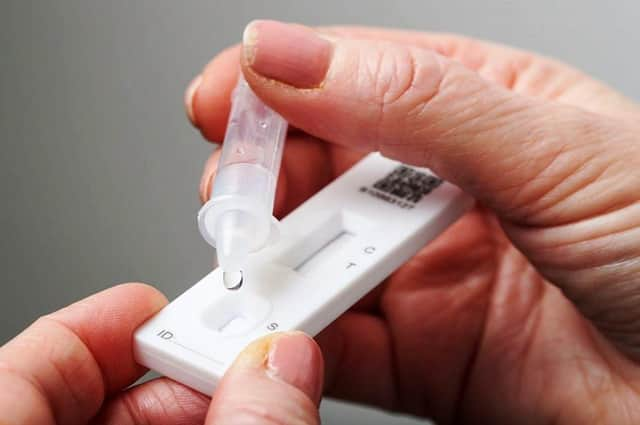Robin Swann: Some form of Covid ‘surveillance’ to remain in NI


This comes after Prime Minister Boris Johnson unveiled his ‘living with Covid’ plan on Monday.
It means that those who test positive for coronavirus will no longer be legally required to self isolate from Thursday, with free universal testing set to end in April in England.
Advertisement
Hide AdAdvertisement
Hide AdBut Northern Ireland’s health minister said no decisions have been taken on any changes to test and trace in the Province.
“My department continues to keep all aspects of the Covid-19 test and trace programme in Northern Ireland under review to ensure it remains proportionate and effective,” Robin Swann said.
“Our key priorities for testing include ensuring that it is prioritised for those who need it most. It is also imperative that we have appropriate contingency planning in place, with flexible testing capability which can be rapidly deployed to respond to any future variants or seasonal surges. Robust surveillance systems must also be maintained, to ensure any new developments in the pandemic are swiftly detected.
“Keeping the public safe, in particular those at highest risk of severe illness, will continue to be at the centre of our considerations. Any policy changes will be informed by the latest clinical and scientific advice and consideration of the Covid situation in Northern Ireland.”
Advertisement
Hide AdAdvertisement
Hide AdMr Swann added: “Covid-19 remains a serious health risk, particularly for those who are vulnerable. It is vital that we do not let our guard down. We can all help to keep the people close to us safe by continuing to make safer choices and following the latest guidance.”
Dr Laurence Dorman, chair of the Royal College of GPs in Northern Ireland, also suggested some form of testing is likely to remain.
“Every year, a few select practices are involved in flu surveillance,” he told the News Letter.
“So we already monitor for certain illnesses and general practice plays a key role in that. I don’t know exactly what will happen now but there will have to be some sort of monitoring.
Advertisement
Hide AdAdvertisement
Hide Ad“It won’t disappear entirely. Now, I don’t know what that will look like – whether mass testing with free lateral flow tests, or whether it’s practices having to test some of the practices.
“There will have to be some sort of testing. If someone gets very sick with respiratory symptoms, for example, they’ll have to have tests.”
He added: “Of course the funding is finite, so the current testing programme will have to come to an end at some stage. The question is when.”
Prior to his announcement today, the prime minister had suggested mass testing could soon come to an end due to the cost to the public purse of nearly £2 billion a month.